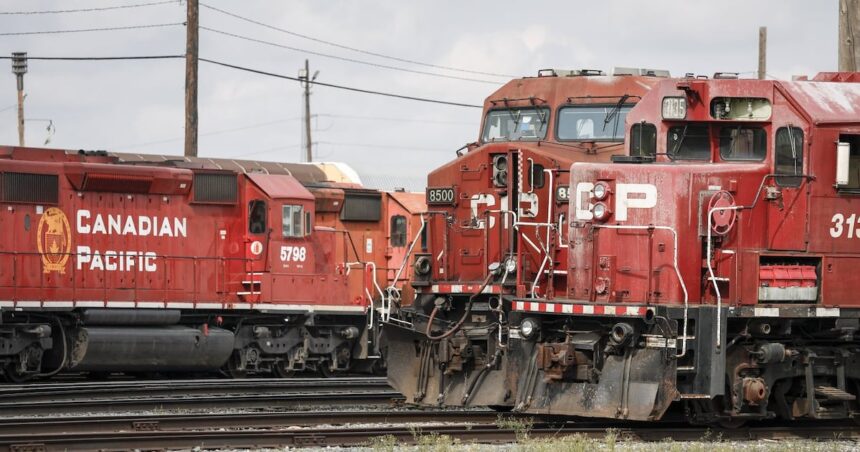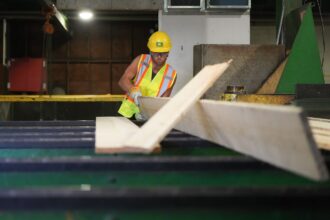The boardroom at CPKC’s headquarters has become a weather station of sorts—monitoring economic storm fronts that threaten to derail the railway giant’s ambitious growth plans. Despite posting a first-quarter profit increase of 11%, CPKC executives have taken the unusual step of lowering their financial forecast for the remainder of 2025, citing growing concerns over North American trade uncertainty.
“We’re seeing warning signals that can’t be ignored,” said Keith Creel, CPKC’s President and CEO during Tuesday’s investor call. “While our operational integration continues to exceed expectations, the macroeconomic headwinds facing cross-border commerce are intensifying in ways we hadn’t fully anticipated at the start of the year.”
The Calgary-based railway, formed through the 2023 merger of Canadian Pacific and Kansas City Southern, initially projected revenue growth between 9-10% for 2025. That target has now been revised downward to 4-6%, sending shares tumbling 5.8% in Wednesday trading—their steepest single-day decline since the merger was finalized.
Behind the recalibration lies a complex web of trade tensions. Proposed tariff changes on cross-border goods, particularly in the automotive and agriculture sectors, have begun slowing shipment volumes along CPKC’s crucial Mexico-U.S.-Canada corridor. First-quarter automotive shipments fell 3.2% compared to the previous year, while grain volumes dropped 5.1%.
Financial results, however, tell a more nuanced story. CPKC reported a Q1 profit of $835 million, up from $753 million during the same period last year. Revenue increased 8.8% to $3.67 billion, driven primarily by the company’s operational synergies and pricing power with existing contracts.
“We’re seeing the classic disconnect between operational excellence and market uncertainty,” explained transportation analyst Maria Fernandez at BMO Capital Markets. “CPKC has successfully integrated two railway systems faster than anyone expected, but those efficiencies can’t fully insulate them from broader trade headwinds.”
The railway’s predicament reflects wider concerns across North America’s transportation sector. With negotiations over critical trade provisions becoming increasingly contentious, companies with significant cross-border exposure are bracing for potential disruptions. CPKC, with its unique tri-national network, finds itself particularly vulnerable.
Chief Financial Officer Nadeem Velani emphasized that while adjusting forecasts was prudent, the company remains committed to its long-term strategy. “The merger thesis remains intact,” Velani stated. “We’ve created the only single-line rail network connecting the three USMCA countries, and that competitive advantage becomes even more valuable during uncertain times as shippers seek reliability.”
Cost-control measures have already been implemented, with capital expenditures for 2025 trimmed by $175 million to $1.8 billion. The company has also delayed plans to add 200 new positions across its network, instead focusing on operational efficiencies within its existing workforce.
Industry observers note that CPKC’s cautious approach stands in contrast to some competitors who have maintained their full-year guidance despite similar exposure to trade uncertainties. “They’re being transparent, which Wall Street doesn’t always reward in the short term,” noted rail industry consultant Thomas Mulligan. “But this conservative stance may position them better if trade tensions escalate further.”
For investors, the key question remains whether CPKC’s revised forecast represents a temporary recalibration or signals deeper structural challenges for North American freight railways. The answer may depend less on CPKC’s operational execution—which by most metrics remains impressive—and more on the unpredictable path of international trade policy in the coming months.
As freight volumes react to policy shifts and economic indicators, CPKC finds itself navigating a precarious balance—delivering on merger synergies while adjusting to a less predictable future. The railway that promised to revolutionize North American freight transportation now finds itself serving as a barometer for the continent’s economic integration.
“We built this network for the long game,” Creel reminded analysts during the call’s closing remarks. “We still believe the future










